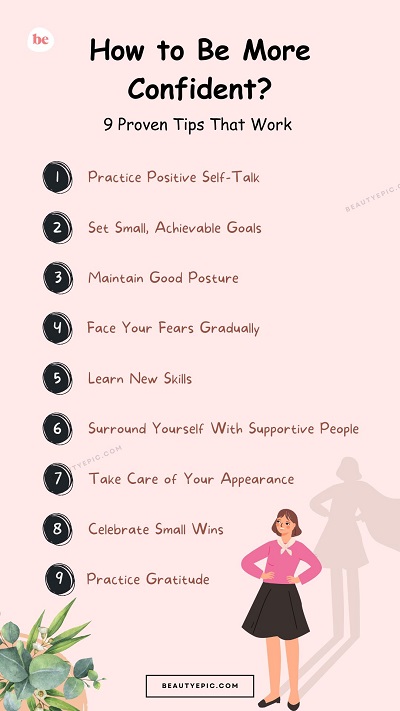
Important: This article is for informational purposes only. Please read our full disclaimer for more details.
Confidence is more than just feeling good about yourself—it’s a powerful mindset that influences how you handle challenges, connect with others, and pursue opportunities. Many people believe confidence is something you’re either born with or without, but research shows it’s a skill that can be learned and strengthened over time.
Whether you struggle with self-doubt or want to boost your presence in personal and professional settings, these strategies can help you build authentic, lasting confidence.
9 Practical Tips to Build Unshakable Confidence
1. Practice Positive Self-Talk
Your inner dialogue shapes your self-image. Replace negative thoughts, such as “I can’t do this,” with affirmations like “I am capable of learning and improving.”
- Action Step: Write down three positive affirmations daily to reinforce self-belief.
- Better Insight: Studies in Social Cognitive and Affective Neuroscience show that self-affirmations activate the brain’s reward centers, helping you respond to challenges with greater resilience (1).
2. Set Small, Achievable Goals
Breaking big ambitions into small, manageable goals creates consistent wins. Each accomplishment boosts your sense of capability.
- Action Step: Create weekly goals and track your progress.
- Why it Works: Achieving small milestones triggers dopamine release, reinforcing motivation and confidence.
3. Maintain Good Posture
How you carry yourself affects how you feel. Standing tall with your shoulders back not only makes you appear confident to others but also signals assurance to your brain.
- Action Step: Practice a “power pose” (open, upright posture) for 2 minutes daily.
- Research says: Harvard research on body language shows posture influences hormone levels linked to confidence (2).
4. Face Your Fears Gradually
Avoiding challenges reinforces insecurity. Facing fears in small steps helps you build courage and resilience.
- Action Step: List situations that make you nervous and tackle them one at a time, starting with the least intimidating.
- Better Insight: Exposure therapy studies demonstrate that gradual exposure reduces anxiety and increases confidence over time (3).
5. Learn New Skills
Competence breeds confidence. When you invest time in learning, you feel prepared and capable.
- Action Step: Dedicate 30 minutes daily to mastering a skill relevant to your goals.
- Scientific Link: Research in Psychological Science shows skill mastery improves self-efficacy and long-term confidence (4).
6. Surround Yourself With Supportive People
Your environment influences how you see yourself. Supportive people reinforce your strengths and encourage growth.
- Action Step: Build a network of positive, uplifting individuals and limit exposure to constant critics.
- Why it Matters: Studies indicate that social support buffers against self-doubt and enhances self-esteem (5).
7. Take Care of Your Appearance
Looking good helps you feel good. While confidence goes deeper than appearance, presenting yourself well can give you an immediate boost.
- Action Step: Develop a simple grooming or style routine that reflects how you want to feel.
- Research Note: Journal of Experimental Social Psychology found that wearing clothes associated with power improves self-perception and performance (6).
8. Celebrate Small Wins
Acknowledging progress keeps you motivated and reminds you of your capabilities.
- Action Step: Keep a “confidence journal” where you record achievements daily or weekly.
- Expert Insight: Recognition of progress reinforces positive behaviors and builds long-term self-esteem (7).
9. Practice Gratitude
Focusing on what you have rather than what you lack shifts your mindset to positivity and abundance, which fuels confidence.
- Action Step: Write down three things you’re grateful for each morning.
- Scientific Backing: Research published in Personality and Individual Differences shows gratitude improves optimism and self-worth (8).
Confidence vs. Insecurity: Spotting the Difference
| Traits of Confident People | Traits of Insecure People |
|---|---|
| Maintain eye contact | Avoid eye contact |
| Accept mistakes and learn from them | Fear failure and hide errors |
| Encourage others’ success | Feel threatened by others |
| Speak with clarity and purpose | Second-guess their words |
| Take responsibility for actions | Blame external factors |
Why Building Confidence Changes Everything
Confidence impacts every aspect of life. According to studies in the Journal of Personality and Social Psychology, confident individuals are more likely to be perceived as competent leaders, make better decisions, and maintain healthier relationships. High confidence also reduces stress levels, enhances problem-solving, and improves overall happiness.
Frequently Asked Questions (FAQ’S)
1. Can introverts develop confidence?
A. Yes. Confidence isn’t about being loud; it’s about trusting your abilities. Introverts can build quiet, steady confidence that is just as impactful as extroverted expression.
2. How long does it take to boost confidence?
A. It varies. With consistent practice, noticeable changes can occur in weeks, but long-term habits solidify over months.
3. What if I fail while trying to be confident?
A. Failure is part of the process. Each setback provides valuable lessons that strengthen resilience and self-belief over time.
Confidence isn’t a fixed trait—it’s a skill you can develop with daily practice and intentional mindset shifts. By applying these nine tips, you can cultivate authentic self-assurance that positively impacts every aspect of your life. Remember, small, consistent actions lead to lasting change.
















